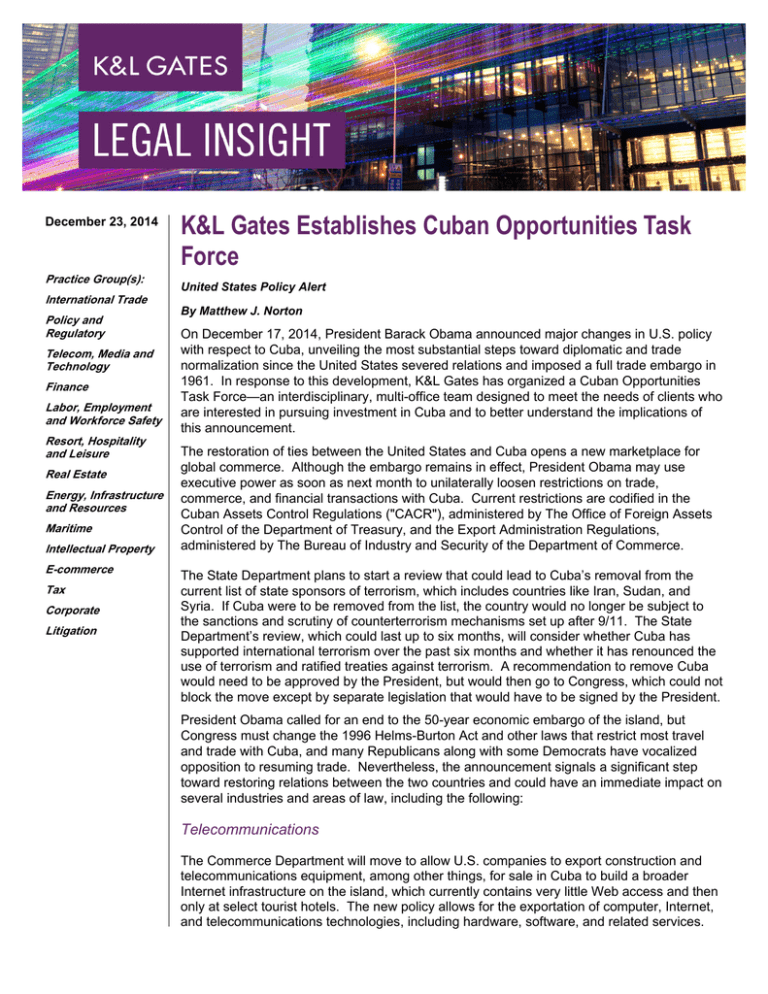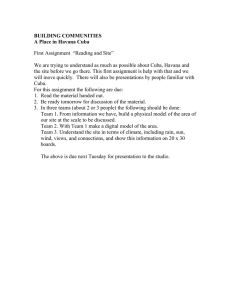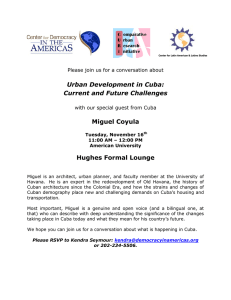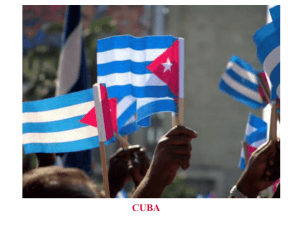
December 23, 2014
Practice Group(s):
K&L Gates Establishes Cuban Opportunities Task
Force
United States Policy Alert
International Trade
Policy and
Regulatory
Telecom, Media and
Technology
Finance
Labor, Employment
and Workforce Safety
Resort, Hospitality
and Leisure
Real Estate
Energy, Infrastructure
and Resources
Maritime
Intellectual Property
E-commerce
Tax
Corporate
Litigation
By Matthew J. Norton
On December 17, 2014, President Barack Obama announced major changes in U.S. policy
with respect to Cuba, unveiling the most substantial steps toward diplomatic and trade
normalization since the United States severed relations and imposed a full trade embargo in
1961. In response to this development, K&L Gates has organized a Cuban Opportunities
Task Force—an interdisciplinary, multi-office team designed to meet the needs of clients who
are interested in pursuing investment in Cuba and to better understand the implications of
this announcement.
The restoration of ties between the United States and Cuba opens a new marketplace for
global commerce. Although the embargo remains in effect, President Obama may use
executive power as soon as next month to unilaterally loosen restrictions on trade,
commerce, and financial transactions with Cuba. Current restrictions are codified in the
Cuban Assets Control Regulations ("CACR"), administered by The Office of Foreign Assets
Control of the Department of Treasury, and the Export Administration Regulations,
administered by The Bureau of Industry and Security of the Department of Commerce.
The State Department plans to start a review that could lead to Cuba’s removal from the
current list of state sponsors of terrorism, which includes countries like Iran, Sudan, and
Syria. If Cuba were to be removed from the list, the country would no longer be subject to
the sanctions and scrutiny of counterterrorism mechanisms set up after 9/11. The State
Department’s review, which could last up to six months, will consider whether Cuba has
supported international terrorism over the past six months and whether it has renounced the
use of terrorism and ratified treaties against terrorism. A recommendation to remove Cuba
would need to be approved by the President, but would then go to Congress, which could not
block the move except by separate legislation that would have to be signed by the President.
President Obama called for an end to the 50-year economic embargo of the island, but
Congress must change the 1996 Helms-Burton Act and other laws that restrict most travel
and trade with Cuba, and many Republicans along with some Democrats have vocalized
opposition to resuming trade. Nevertheless, the announcement signals a significant step
toward restoring relations between the two countries and could have an immediate impact on
several industries and areas of law, including the following:
Telecommunications
The Commerce Department will move to allow U.S. companies to export construction and
telecommunications equipment, among other things, for sale in Cuba to build a broader
Internet infrastructure on the island, which currently contains very little Web access and then
only at select tourist hotels. The new policy allows for the exportation of computer, Internet,
and telecommunications technologies, including hardware, software, and related services.
K&L Gates Establishes Cuban Opportunities Task Force
Real Estate; Travel and Hospitality
Last year, some 400,000 Americans traveled to Cuba. Though broad U.S. tourism is not yet
a reality, the Obama administration is expanding the categories of legal travel to Cuba, which
will now include family visits, government business, journalism, professional research and
meetings, educational activities, religious activities, “support for the Cuban people,”
humanitarian projects, private foundation work and research, import/export work, art and
athletic performances, clinics and workshops, and other export transactions. New rules will
also make it easier for qualifying parties to travel to Cuba by (i) allowing the direct purchase
of airline tickets to Cuba rather than requiring travelers to go through a travel agent and
chartered flight; and (ii) permitting U.S. persons to participate in third-country professional
meetings and conferences related to Cuba.
Additionally, the Administration announced that travelers may use credit and debit cards
issued by U.S. banks. Under an amended CACR, licensed U.S. travelers will be authorized
to import US$400 worth of goods, of which no more than US$100 can consist of tobacco
products and alcohol combined. The Treasury Department is also quadrupling the amount of
money that can be sent from Americans to Cubans each quarter, from US$500 to US$2,000,
and is loosening banking restrictions.
American resort and hospitality developers have long dreamed of being able to invest and
develop in Cuba. Cuba has a 3,570-mile coastline, and the Caribbean island is only 90 miles
from Key West. To put that in perspective, the distance from New York to Miami is 1,281
miles, one-third the size of Cuba's coastline. In addition to the embargo being lifted for U.S.
direct hospitality and real estate development, the Cuban government will need to enact
private property and tourism legislation before seeing a wave of American investment.
Nonetheless, American hospitality investors will most likely look into joint venture structures
with qualified investors through non-U.S. subsidiaries.
Finance
The President announced plans to facilitate authorized transactions between the United
States and Cuba, including U.S. institutions being permitted to open correspondent accounts
at Cuban financial institutions to facilitate the processing of authorized transactions. Further,
U.S.-owned or controlled entities in third countries will be generally licensed to provide
services to, and engage in financial transactions with, Cuban individuals in third countries.
Further, general licenses will unblock the accounts at U.S. banks of Cuban nationals who
have relocated outside of Cuba.
Exports and Trade
The Administration plans to broaden the types of goods that may be sold and exported to
Cuba and ease the required financial terms. The Treasury Department plans to issue a
series of regulations to ease agricultural exports. The Commerce Department said it would
loosen an array of export limits, including the sale of tools and equipment to small
businesses not owned by the Cuban government, like construction companies, agricultural
businesses, automobile repair, and beauty shops. Restrictions on scientific, athletic, and
cultural goods, such as musical instruments, will also be relaxed. Further, the Treasury
Department will amend the CACR’s definition of the statutory term “cash in advance” to
specify that it means “cash before transfer of title,” a move that will be applauded by
2
K&L Gates Establishes Cuban Opportunities Task Force
American exporters. Finally, the Administration announced that foreign vessels would be
allowed to enter the United States after engaging in certain humanitarian trade with Cuba.
Reparations and Property Recovery by Cuban-Americans
The issue of reclaiming lost property that was confiscated after Castro’s rise to power
remains at the forefront of the minds of many Cuban-Americans. This reclamation of
property from the government, or compensation in lieu of, will most likely create a crossborder legal battle and will likely be the subject of much lobbying and negotiation.
Summary
The President's announcement last week will have significant political ramifications, which
should lead to increased economic opportunities for American businesses in Cuba.
Nevertheless, significant barriers remain.
Led by Charleston partner Matt Norton and Miami partner Dan Casey, the Cuban
Opportunities Task Force facilitates the deployment of K&L Gates’ broad platform of offices
and services to assist our clients in addressing these issues. The task force is positioned to
call upon the various relevant disciplines in the firm to handle the multitude of issues that will
arise as U.S.-Cuban relations normalize and business opportunities ripen. The task force
will be comprised of attorneys from the firm’s Miami, Washington, D.C., New York, Houston,
Sao Paulo, London, Brussels, and Charleston offices, among others, as well as from a range
of the firm’s practice groups, including international trade, policy and regulatory,
telecommunications, finance, energy and infrastructure, labor and employment, real estate,
resort and hospitality, maritime, intellectual property, e-commerce, cross-border tax,
corporate, and litigation.
For more information, contact:
Matthew J. Norton
matt.norton@klgates.com
+1.843.579.5634
Daniel A. Casey
dan.casey@klgates.com
+1.305.539.3324
Michael J. O’Neil
mike.oneil@klgates.com
+1.202.661.6226
Anchorage Austin Beijing Berlin Boston Brisbane Brussels Charleston Charlotte Chicago Dallas Doha Dubai Fort Worth Frankfurt
Harrisburg Hong Kong Houston London Los Angeles Melbourne Miami Milan Moscow Newark New York Orange County Palo Alto Paris
Perth Pittsburgh Portland Raleigh Research Triangle Park San Francisco São Paulo Seattle Seoul Shanghai Singapore Spokane
Sydney Taipei Tokyo Warsaw Washington, D.C. Wilmington
3
K&L Gates Establishes Cuban Opportunities Task Force
K&L Gates comprises more than 2,000 lawyers globally who practice in fully integrated offices located on five
continents. The firm represents leading multinational corporations, growth and middle-market companies, capital
markets participants and entrepreneurs in every major industry group as well as public sector entities, educational
institutions, philanthropic organizations and individuals. For more information about K&L Gates or its locations,
practices and registrations, visit www.klgates.com.
This publication is for informational purposes and does not contain or convey legal advice. The information herein should not be used or relied upon in
regard to any particular facts or circumstances without first consulting a lawyer.
© 2014 K&L Gates LLP. All Rights Reserved.
4





